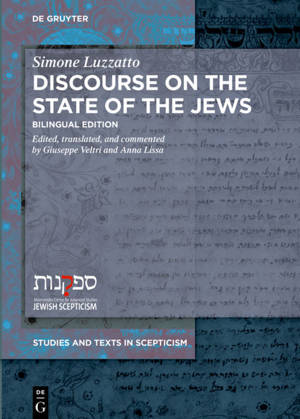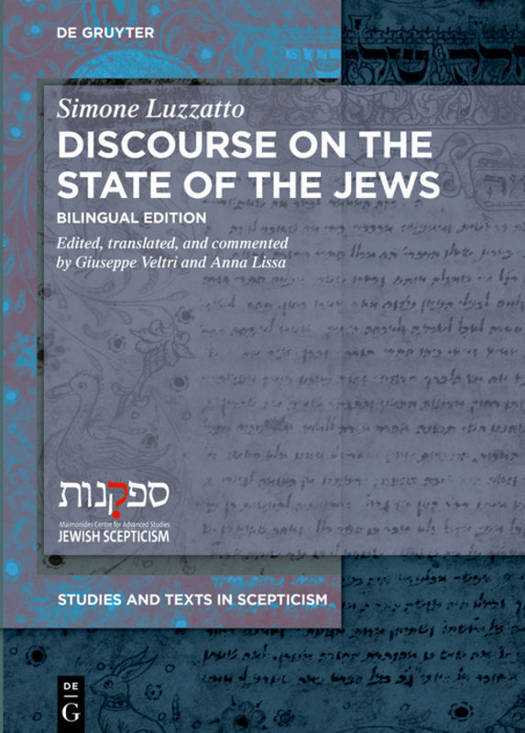
Bedankt voor het vertrouwen het afgelopen jaar! Om jou te bedanken bieden we GRATIS verzending (in België) aan op alles gedurende de hele maand januari.
- Afhalen na 1 uur in een winkel met voorraad
- Gratis thuislevering in België vanaf € 30
- Ruim aanbod met 7 miljoen producten
Bedankt voor het vertrouwen het afgelopen jaar! Om jou te bedanken bieden we GRATIS verzending (in België) aan op alles gedurende de hele maand januari.
- Afhalen na 1 uur in een winkel met voorraad
- Gratis thuislevering in België vanaf € 30
- Ruim aanbod met 7 miljoen producten
Zoeken
Omschrijving
In 1638, a small book of no more than 92 pages in octavo was published "appresso Gioanne Calleoni" under the title "Discourse on the State of the Jews and in particular those dwelling in the illustrious city of Venice." It was dedicated to the Doge of Venice and his counsellors, who are labelled "lovers of Truth." The author of the book was a certain Simone (Simḥa) Luzzatto, a native of Venice, where he lived and died, serving as rabbi for over fifty years during the course of the seventeenth century.
Luzzatto's political thesis is simple and, at the same time, temerarious, if not revolutionary: Venice can put an end to its political decline, he argues, by offering the Jews a monopoly on overseas commercial activity. This plan is highly recommendable because the Jews are "wellsuited for trade," much more so than others (such as "foreigners," for example). The rabbi opens his argument by recalling that trade and usury are the only occupations permitted to Jews. Within the confines of their historical situation, the Venetian Jews became particularly skilled at trade with partners from the Eastern Mediterranean countries. Luzzatto's argument is that this talent could be put at the service of the Venetian government in order to maintain - or, more accurately, recover - its political importance as an intermediary between East and West. He was the first to define the role of the Jews on the basis of their economic and social functions, disregarding the classic categorisation of Judaism's alleged privileged religious status in world history.
Nonetheless, going beyond the socio-economic arguments of the book, it is essential to point out Luzzatto's resort to sceptical strategies in order to plead in defence of the Venetian Jews. It is precisely his philosophical and political scepticism that makes Luzzatto's texts so unique.
This edition aims to grant access to his works and thought to English-speaking readers and scholars. By approaching his texts from this point of view, the editors hope to open a new path in research into Jewish culture and philosophy that will enable other scholars to develop new directions and new perspectives, stressing the interpenetration between Jews and the surrounding Christian and secular cultures.
Luzzatto's political thesis is simple and, at the same time, temerarious, if not revolutionary: Venice can put an end to its political decline, he argues, by offering the Jews a monopoly on overseas commercial activity. This plan is highly recommendable because the Jews are "wellsuited for trade," much more so than others (such as "foreigners," for example). The rabbi opens his argument by recalling that trade and usury are the only occupations permitted to Jews. Within the confines of their historical situation, the Venetian Jews became particularly skilled at trade with partners from the Eastern Mediterranean countries. Luzzatto's argument is that this talent could be put at the service of the Venetian government in order to maintain - or, more accurately, recover - its political importance as an intermediary between East and West. He was the first to define the role of the Jews on the basis of their economic and social functions, disregarding the classic categorisation of Judaism's alleged privileged religious status in world history.
Nonetheless, going beyond the socio-economic arguments of the book, it is essential to point out Luzzatto's resort to sceptical strategies in order to plead in defence of the Venetian Jews. It is precisely his philosophical and political scepticism that makes Luzzatto's texts so unique.
This edition aims to grant access to his works and thought to English-speaking readers and scholars. By approaching his texts from this point of view, the editors hope to open a new path in research into Jewish culture and philosophy that will enable other scholars to develop new directions and new perspectives, stressing the interpenetration between Jews and the surrounding Christian and secular cultures.
Specificaties
Betrokkenen
- Auteur(s):
- Uitgeverij:
Inhoud
- Aantal bladzijden:
- 395
- Taal:
- Duits
- Reeks:
- Reeksnummer:
- nr. 7
Eigenschappen
- Productcode (EAN):
- 9783110487336
- Verschijningsdatum:
- 8/07/2019
- Uitvoering:
- Hardcover
- Formaat:
- Genaaid
- Afmetingen:
- 170 mm x 244 mm
- Gewicht:
- 830 g

Alleen bij Standaard Boekhandel
+ 286 punten op je klantenkaart van Standaard Boekhandel
Beoordelingen
We publiceren alleen reviews die voldoen aan de voorwaarden voor reviews. Bekijk onze voorwaarden voor reviews.









